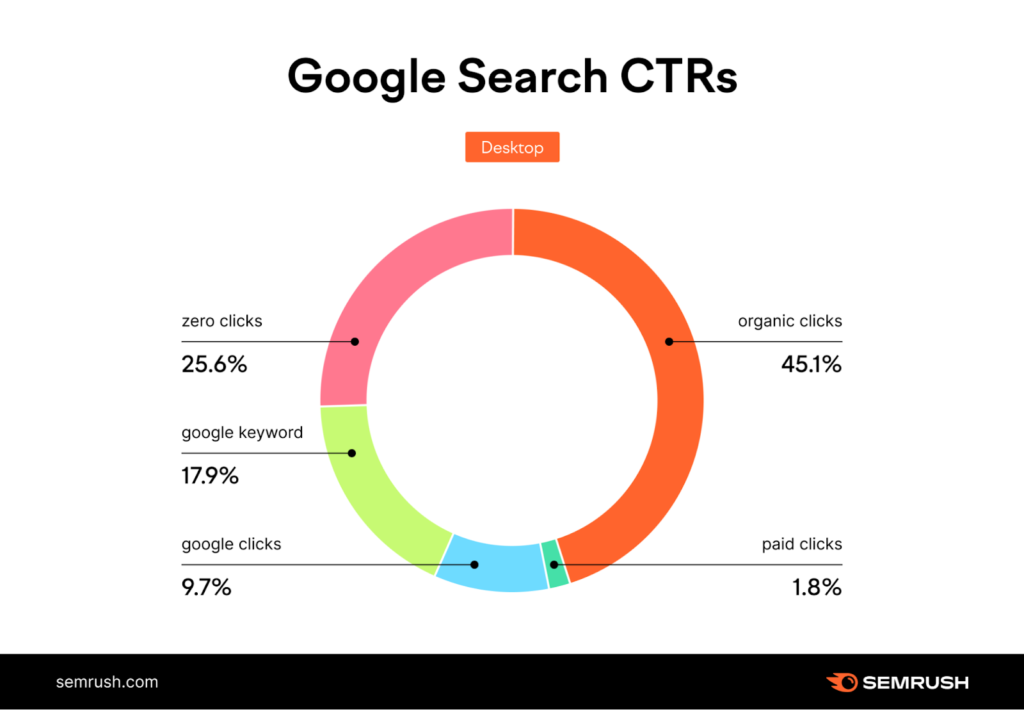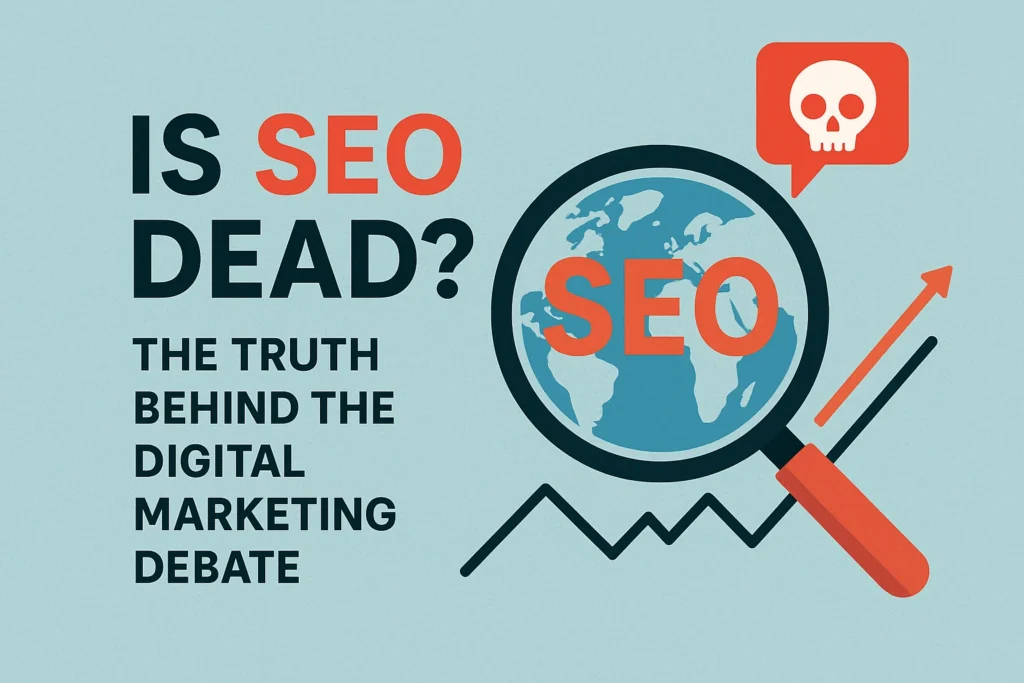In the ever-evolving world of digital marketing, one question seems to resurface time and again: “Is SEO dead?” This debate has been ongoing for years, with skeptics pointing to algorithm changes, the rise of AI, and new marketing channels as evidence of SEO’s demise. But is there truth to these claims, or is SEO more alive than ever?
Understanding SEO in Today’s Digital Landscape
Search Engine Optimization (SEO) is the practice of improving your website’s visibility in search engine results pages (SERPs) through organic, non-paid methods. Despite claims of its death, SEO continues to be a cornerstone of digital marketing strategies worldwide.
What Has Changed in SEO?
The SEO landscape has indeed transformed significantly over the past decade. Google’s algorithm updates have become more sophisticated, user behavior has evolved, and new technologies have emerged. However, these changes don’t signal SEO’s death—they represent its evolution.
The Arguments: Why People Think SEO Is Dead

Algorithm Complexity
Search engines, particularly Google, have introduced hundreds of ranking factors that make traditional SEO tactics less predictable. The days of simple keyword stuffing and link farming are long gone.
Rise of AI and Voice Search
Artificial intelligence and voice search have changed how people interact with search engines. Users now ask questions more naturally, requiring a shift in SEO strategies.
Increased Competition
With millions of websites competing for attention, achieving top rankings has become increasingly challenging, leading some to believe SEO is no longer effective.
Paid Advertising Dominance
The prominence of paid search results and social media advertising has led some marketers to question the value of organic search optimization.
The Reality: Why SEO Is Very Much Alive

Search Volume Continues to Grow
Google processes over 8.5 billion searches daily, and this number continues to increase year over year. As long as people search for information online, SEO will remain relevant.
Organic Traffic Drives Business Results
Studies consistently show that organic search drives more traffic and conversions than any other marketing channel. Businesses that invest in SEO see measurable returns on their investment.
SEO Has Evolved, Not Died
Modern SEO focuses on user experience, quality content, and technical optimization rather than outdated tactics. This evolution makes SEO more valuable, not obsolete.
Integration with Other Marketing Channels
SEO now works synergistically with content marketing, social media, and paid advertising, creating a more holistic digital marketing approach.
Modern SEO: What It Looks Like Today
User Experience Focus
Today’s SEO prioritizes page speed, mobile responsiveness, and overall user experience. Search engines reward websites that provide genuine value to users.
Content Quality Over Quantity
High-quality, comprehensive content that answers user questions and solves problems ranks better than thin, keyword-stuffed pages.
Technical SEO Importance
Website architecture, structured data, and technical optimization play crucial roles in modern SEO success.
E-A-T (Expertise, Authoritativeness, Trustworthiness)
Search engines increasingly value content created by experts and published on authoritative, trustworthy websites.
The Future of SEO
AI and Machine Learning Integration
Rather than killing SEO, AI is changing how we approach it. SEO professionals now use AI tools for keyword research, content optimization, and performance analysis.
Voice and Visual Search Optimization
SEO is adapting to include optimization for voice queries and image searches, expanding its scope rather than diminishing it.
Local and Mobile-First Indexing
With mobile searches dominating and local search becoming crucial for businesses, SEO continues to evolve to meet these needs.
How to Succeed with Modern SEO
Focus on User Intent
Understanding what users are truly looking for and creating content that satisfies their intent is more important than ever.
Build Authority and Trust
Establishing your website as an authoritative source in your industry through quality content and reputable backlinks remains crucial.
Optimize for Core Web Vitals
Technical performance metrics like page speed, interactivity, and visual stability directly impact rankings.
Create Comprehensive Content
In-depth, well-researched content that covers topics thoroughly tends to perform better in search results.
Conclusion: SEO Is Not Dead—It’s Evolving
The question “Is SEO dead?” stems from a misunderstanding of what modern SEO entails.
While the tactics and strategies have evolved dramatically, the fundamental principle remains the same: helping search engines understand and rank your content for relevant queries.
SEO isn’t dead—it’s more sophisticated, more integrated, and more focused on user value than ever before.
Businesses that adapt their SEO strategies to focus on user experience, quality content, and technical excellence will continue to see success in organic search.
The key is to stop thinking of SEO as a set of tricks to game search engines and start viewing it as a way to genuinely improve your website’s value for users. When you do that, SEO becomes not just alive, but thriving.
Frequently Asked Questions (FAQs)
1. Is SEO still worth investing in for small businesses?
Absolutely. SEO is particularly valuable for small businesses because it provides a cost-effective way to compete with larger companies. Local SEO can help small businesses attract customers in their area, and long-tail keyword strategies can help them rank for specific, less competitive terms. The key is to focus on creating valuable content for your specific audience and optimizing your website properly.
2. How long does it take to see results from SEO efforts?
SEO is a long-term strategy that typically takes 3-6 months to show significant results, though some improvements can be seen sooner. The timeline depends on factors like your website’s current state, competition level, and the quality of your SEO implementation. Patience and consistency are crucial for SEO success.
3. Will AI tools like ChatGPT replace the need for SEO?
AI tools are changing how people search for information, but they don’t eliminate the need for SEO. In fact, AI tools often pull information from websites that rank well in search engines. Additionally, many AI platforms are integrating with search engines, making SEO even more important for visibility in AI-generated responses.
4. What’s the difference between old SEO and modern SEO?
Old SEO focused heavily on keyword density, link quantity, and technical tricks to manipulate rankings. Modern SEO emphasizes user experience, content quality, search intent, and providing genuine value. Today’s SEO is more holistic, considering factors like page speed, mobile-friendliness, and user engagement metrics.
5. Can social media marketing replace SEO?
Social media marketing and SEO serve different purposes and work best when used together. Social media is excellent for engagement and brand awareness, while SEO drives targeted traffic from people actively searching for solutions. Social signals can indirectly support SEO efforts, and SEO can help your content get discovered on social platforms. Both are essential components of a comprehensive digital marketing strategy.

Hi, I’m Chandan Chauhan, a Digital Marketing Specialist with 4 years of proven experience in SEO and Social Media Management. I help businesses build a strong online presence, drive organic traffic, and create engaging content that connects with the right audience.

